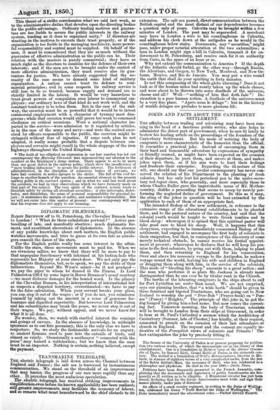DIPLOMATIC PH2EITOMENA.
BARON Batasicow off to St. Petersburg, the Chevalier Bunsen back to London ! " What do these exhalations portend? " Active pro- tocolling of late, and manifestly abortive ; much diplomatic fer- ment, and exorbitant aberrations of diplomatists. In the absence of any public knowledge about such matters, the English public watches movements, and tries to guess at its own fate as astrolo- gers consult the dance of the stars.
For the English public really has some interest in the affair. Unlike the stars, these movements must be paid for. When we see vivacious sallies, we know that there will be more to pay to that unpopular functionary with inkstand at his button-hole who represents her Majesty at your street-door. We not only pay the diplomatists themselves, but, so to speak, we pay the debts of their indiscretions. Beyond Mr. Wyse's salary—be it not grudged— we pay the piper to whom he danced in the Piraeus. Is Lord Palmerston tiffed by some lapse in Baron Brunnow's usual courtesy —we must disburse damages for the heated word. Is the pliancy of the Chevalier Bunsen, in his interpretation of international law as respects a disputed territory, overestimated—we have to pay for the false calculation. When your servant breaks your glass, you can stop it out of the wages ; or if you do not, you reimburse yourself by taking out the amount in a sense of generous for- bearance and dignified superiority. But however Lord Palmerston and his subordinates may break the peace, we never stop it out of their wages. We pay, without appeal, and we never know for what it is all done.
No wonder, then, we watch with startled interest the comings and goings of envoys. In the absence of knowledge, in midnight ignorance as to our fate pecuniary, this is the only clue we have to oonjecture. So, we study the fashionable arrivals for an augury, as ancient Romans used toplore into the entrails of birds, and almost as vainly. Occasional y a soothsayer " connected with the press" may hazard a vaticination; but we know that the man must be an impostor. Nothing is certain, nothing believed, except the payment


























 Previous page
Previous page